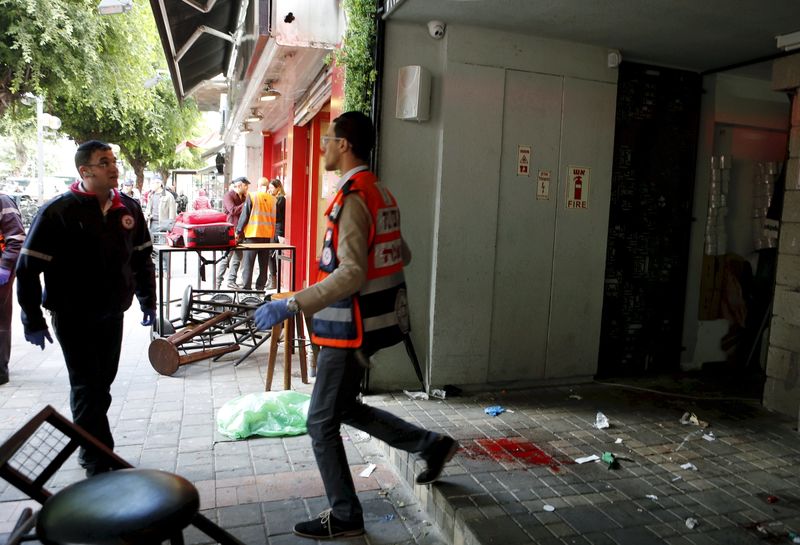By Dan Williams
JERUSALEM (Reuters) - It appeared to have hallmarks of the first Islamic State attack in Israel: A Muslim citizen opened fire on a Tel Aviv bar days after the militant group threatened the country, and left behind a black ISIS banner.
But security officials, given pause by the erratic conduct of the slain gunman and wary of aggravating strains with Israel's largely quiescent Arab minority, are steering clear of definitively linking him with Islamic State.
"This really was not a classic ISIS terrorist attack," a security official told Reuters on Thursday after the Shin Bet domestic intelligence agency and Justice Ministry issued their findings on the Jan. 1 shooting rampage by Nashat Melhem that killed three people.
The 31-year-old died a week later in a gunfight with police. The attack fell six weeks after 130 were killed in militant attacks on bars, cafes and a concert hall in Paris.
An Israeli indictment against three Arab citizens for abetting Melhem's escape said he had "sought to help the enemy, including the ISIS group, fight Israel". He left a black banner in Tel Aviv with the group's name in handwritten Arabic and Hebrew as well as a flag with Koranic text, the indictment says.
In selfie recordings released by the authorities, Melhem is seen holding a bullet and vowing to hit "the Jews" again in Tel Aviv, cursing Shia Islam and telling U.S. President Barack Obama: "Become a Muslim, you Crusader, if you want to be saved."
He also uses foul language and is seen drinking from a beer bottle, smoking and bragging about taking drugs. Relatives said Melhem, previously jailed for assaulting an Israeli soldier, had psychiatric problems.
The security official described Melhem's behavior as inconsistent with Islamist piety and a reason the Shin Bet believed he acted alone. Another was the absence of any evidence he received direct instruction from Islamic State.
By contrast, the Shin Bet last year arrested several Israeli Arabs it said were trying to form an armed cell under orders from two fellow citizens fighting with Islamic State in Iraq.
Israel faces more active threats from armed Palestinian factions like Hamas, as well as from Hezbollah guerrillas in neighboring Lebanon, though officials point to Islamic State affiliates in the Egyptian Sinai as having the potential to launch cross-border attacks too.
What constitutes genuine Islamic State action outside its Middle East fiefdoms is a question bedevilling security agencies worldwide. They must weigh media outreach, which is designed to inspire "lone wolf" strikes, but are reluctant to exaggerate the scope of the threat.
Yoram Schweitzer, a terrorism expert with Tel Aviv University's Institute for National Security Studies, said Israel was especially mindful of the impact of Melhem's actions on fellow Arabs citizens, who make up a fifth of its population.
While often sympathetic to the Palestinians, Israeli Arabs seldom resort to political violence - a fact often noted by the Shin Bet. But with dozens of Israeli Arabs having left to join Islamic State, authorities worry the domestic danger is growing.
"I think that while the ISIS menace cannot be ignored, what is more important is not to inflate it," Schweitzer said.

"Israeli authorities have an interest in this regard, as no one wants to see Melhem copycats - not least because he managed to kill three people and get away, in what made them look like a bit of a circus."